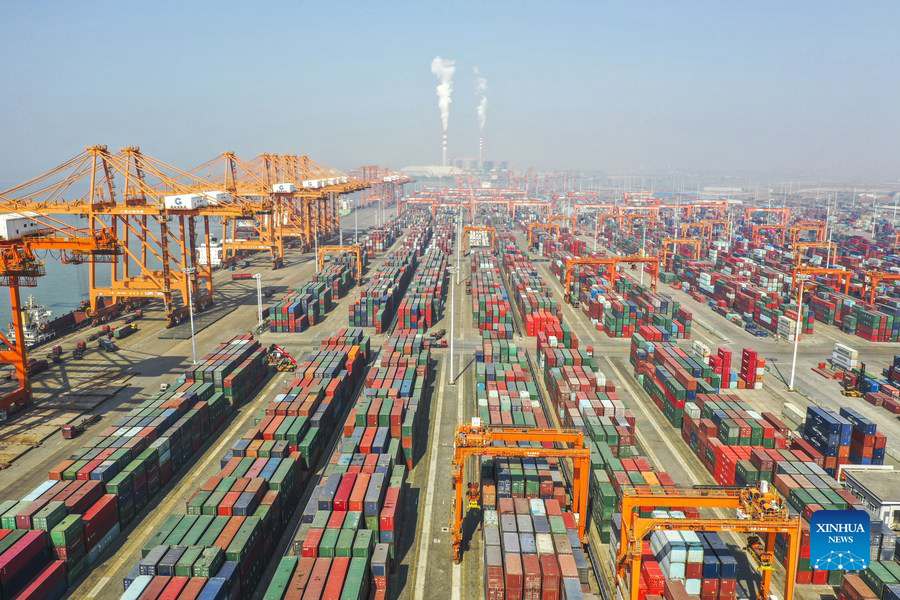Commentary: China a major global growth driver, not free rider

BEIJING, Nov. 10 (Xinhua) -- In its latest round of China-bashing, the United States has colluded with some of its allies to blast China's economic policies and performance over the past 20 years at a recent closed-door World Trade Organization (WTO) meeting.
The flimsy accusations were nothing new. Ever since China's accession to the WTO, the United States has been relentlessly trying to inflate the fallacy that China has been a "free rider" in the world economy. In recent years, these ill-intentioned allegations seem to be on the rise in tandem with the steady growth of the Chinese economy.
As a matter of fact, the "free rider" myth has unmistakably exposed Washington's self-centrism and double standards in global economic activities.
It is true that China's economic miracle in recent decades has been closely connected with its WTO membership. Inflows of foreign capital, technologies and modern management practices, coupled with the hard-working spirit of the Chinese people, have co-authored China's economic leap. In 20 years, China's economy has grown from the sixth to the second largest in the world, its trade in goods from the sixth to the first, and trade in services from the 11th to the second.
But China is neither the biggest nor the only beneficiary. As a study published in 2019 by German think-tank the Bertelsmann Stiftung concluded, the United States benefits the most worldwide from its own WTO membership, having achieved the largest amount of income gains of some 87 billion U.S. dollars in 2016 alone.
Moreover, the United States, with its superpower status, has all along spared no effort to dominate major global economic institutions like the International Monetary Fund (IMF) and dictate the rules of world trade.
While China's integration with the wider world has facilitated its economic takeoff, the country has also given back to the global community. China's own development itself has been a huge contribution, having contributed almost 30 percent on average each year to global economic growth for several consecutive years.
Furthermore, China's advantages in skilled labor, infrastructure and manufacturing systems have enabled the country to make quality goods at relatively low prices. In some sense, the American way of life is made in China.
To further open up and share its development dividends with the wider world, Beijing has over the years continuously improved its domestic business environment, and launched such platforms as the China International Import Expo and the China International Fair for Trade in Services.
Determined to kickstart growth in developing countries, China has proposed the Belt and Road Initiative, which has grown into the world's largest global cooperation platform and the most popular public good over the past eight years.
And China has also in recent years remained the largest export market for the least developed nations, absorbing one fifth of the exports from those countries. Amid the COVID-19 pandemic, it voiced readiness to lend the new allocation of Special Drawing Rights to low-income countries seriously affected by the outbreak via the IMF.
More fundamentally, with an eye toward the future, China has been playing a constructive role in improving global economic governance.
In the face of rising trade protectionism, economic nationalism as well as unilateralism under the disguise of multilateralism, China has been trying to work with the wider world to promote true multilateralism by defending the rules-based multilateral trading system with the WTO at its core, and by championing ever deeper bilateral, multilateral and regional free trade.
Beijing has also supported necessary WTO reforms on topics like trade policy review and e-commerce, as well as an earlier settlement of the WTO's Appellate Body crisis.
Unfortunately, those contributions, in the eyes of Washington, are either ignored or twisted as serious threats to the United States and Beijing's "secret plans" to compete with Washington for global supremacy. They view the global economy as a you-win-I-lose game where the United States should always be on the winning side. No country, not even Washington's allies in Europe, is allowed to challenge America's economic predominance.
In fact, in an age of economic globalization, countries worldwide are already knitted together by increasingly crisscross global industrial and supply chains. They provide one another with goods and services based on their comparative advantages. This nature of reciprocity, though disavowed by those zero-summers in the United States, is how the modern global economy works. In a long-term perspective, all economies win or lose together.
Today, the world economy is still struggling to recover in the throes of a still raging pandemic, surging inflation, chaotic supply chains and a lopsided global economic recovery. Solidarity and win-win cooperation are needed more than ever before.
"The WTO would not be the World Trade Organization without China," said WTO Director-General Ngozi Okonjo-Iweala. At a time of uncertainty, China bashers in the West should stop peddling irresponsible accusations against China and work with Beijing, because at the end of the day, no one alone can handle the sheer complexity and burden of rescuing the global economy.
Photos
Related Stories
Copyright © 2021 People's Daily Online. All Rights Reserved.










